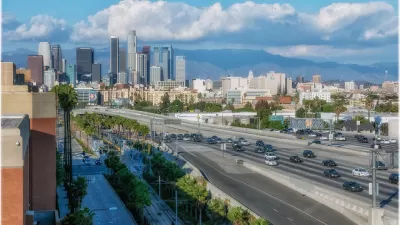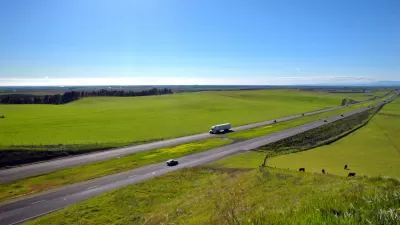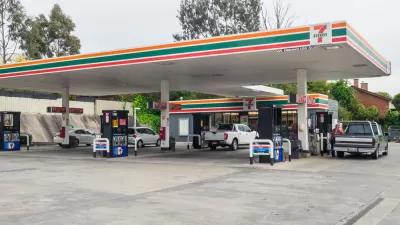Essentially that's what UC Davis, Yale, and MIT researchers found among California families who purchase very fuel efficient vehicles—they also pair them with gas hogs. If your family owns two vehicles, do you meet the profile?

The researchers found the pairing of the opposite types of vehicles by studying California Department of Motor Vehicle trends for two-car households over several years, report Peter Fimrite and Michael Cabanatuan for the San Francisco Chronicle on Sept. 27.
If people buy a more fuel-efficient car, down the road when they replace one of their cars, the car they buy is going to be less fuel-efficient,” said lead author David Rapson, an associate professor of economics at the UC Davis Department of Economics and co-director of the Davis Energy Economics Program. “So the effect of fuel economy standards is reduced.”
The other finding was the rebound effect (also referred to as the energy efficiency paradox) that often comes with the purchase of fuel-efficient vehicles—they are driven more often than had they been less fuel efficient.
These tendencies reduce by up to 60 percent the expected future gas savings from increased fuel economy in two-car households, said the study, which was funded by the California Air Resources Board (CARB).
As someone who has dedicated his career to trying to figure out solutions to climate change, this is troubling,” Rapson said. It means “there is a strong force that we didn’t know about before that is going to erode the benefit of forcing people to buy more fuel-efficient cars.”
The study, released Sept. 19, uses a psychological term to describe this pairing in its title: "Attribute Substitution in Household Vehicle Portfolios [pdf]".
The results don’t mean humans are naturally greedy or hedonistic, Rapson said. In fact, the behavior of car buyers fit “attribution substitution” patterns displayed in previous studies. For instance, households with two children of the same gender are more likely than families with a boy and a girl to have a third child.
Law of unintended consequences
Rapson concludes that the tendency to pair the gas guzzler with the gas sipper, and the tendency to drive the latter more often than one otherwise would, suggests that CARB needs to consider these human tendencies when setting standards in their clean vehicles programs.
“Unintended consequences like this need to be taken into account when making policy,” he said. “On average, fuel economy standards are putting more fuel-efficient cars in households. That can be good if it reduces gasoline use. But if it causes people to buy a bigger, less fuel-efficient second car to compensate, this unintended effect will erode the intended goals of the policy."
Price signals needed
The findings points to the limits of reducing greenhouse gas emissions by regulations alone. "We don’t suggest getting rid of fuel economy standards and doing nothing else,” Rapson told the UC Davis News..
“But our conservation policies need to be effective. A more promising solution is to put a price on carbon, such as what California is doing with cap and trade. It produces economic incentives that evidence shows will reduce carbon emissions."
Cap and trade adds about 12 cents to a gallon of gas in California, according to Ross Brown of the Legislative Analyst's Office.
Another pricing option would be to either supplement or replace the current Clean Vehicle Rebate Project with a "feebate" that would not only incentivize zero-emission vehicles, but also place a surcharge on gas hogs, so consumers might consider the fuel economy of that "second vehicle."
FULL STORY: Fuel-efficient cars often paired with gas guzzlers, study finds

Maui's Vacation Rental Debate Turns Ugly
Verbal attacks, misinformation campaigns and fistfights plague a high-stakes debate to convert thousands of vacation rentals into long-term housing.

Planetizen Federal Action Tracker
A weekly monitor of how Trump’s orders and actions are impacting planners and planning in America.

In Urban Planning, AI Prompting Could be the New Design Thinking
Creativity has long been key to great urban design. What if we see AI as our new creative partner?

Cal Fire Chatbot Fails to Answer Basic Questions
An AI chatbot designed to provide information about wildfires can’t answer questions about evacuation orders, among other problems.

What Happens if Trump Kills Section 8?
The Trump admin aims to slash federal rental aid by nearly half and shift distribution to states. Experts warn this could spike homelessness and destabilize communities nationwide.

Sean Duffy Targets Rainbow Crosswalks in Road Safety Efforts
Despite evidence that colorful crosswalks actually improve intersection safety — and the lack of almost any crosswalks at all on the nation’s most dangerous arterial roads — U.S. Transportation Secretary Duffy is calling on states to remove them.
Urban Design for Planners 1: Software Tools
This six-course series explores essential urban design concepts using open source software and equips planners with the tools they need to participate fully in the urban design process.
Planning for Universal Design
Learn the tools for implementing Universal Design in planning regulations.
Appalachian Highlands Housing Partners
Gallatin County Department of Planning & Community Development
Heyer Gruel & Associates PA
Mpact (founded as Rail~Volution)
City of Camden Redevelopment Agency
City of Astoria
City of Portland
City of Laramie





























